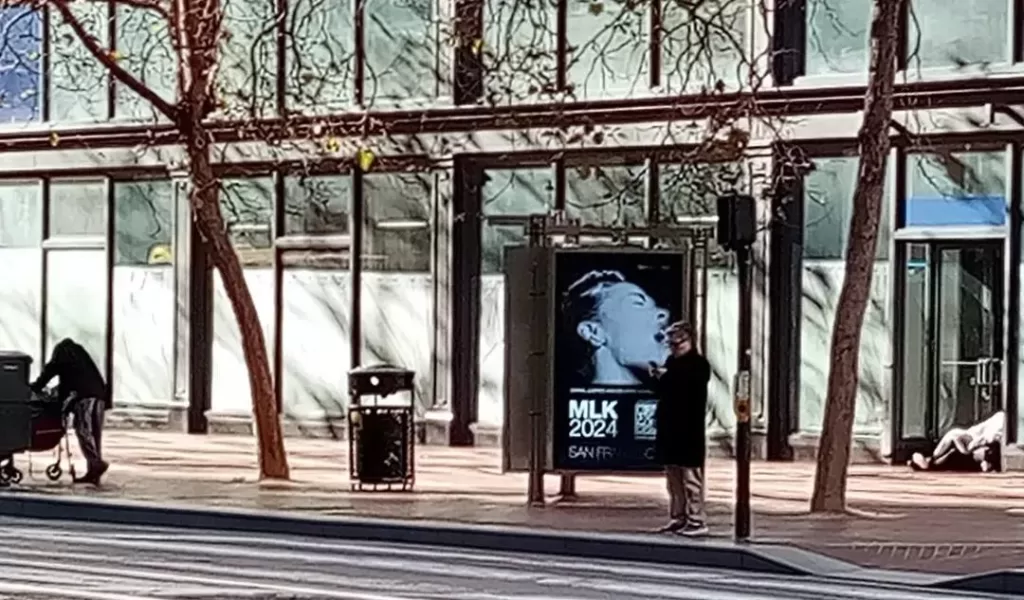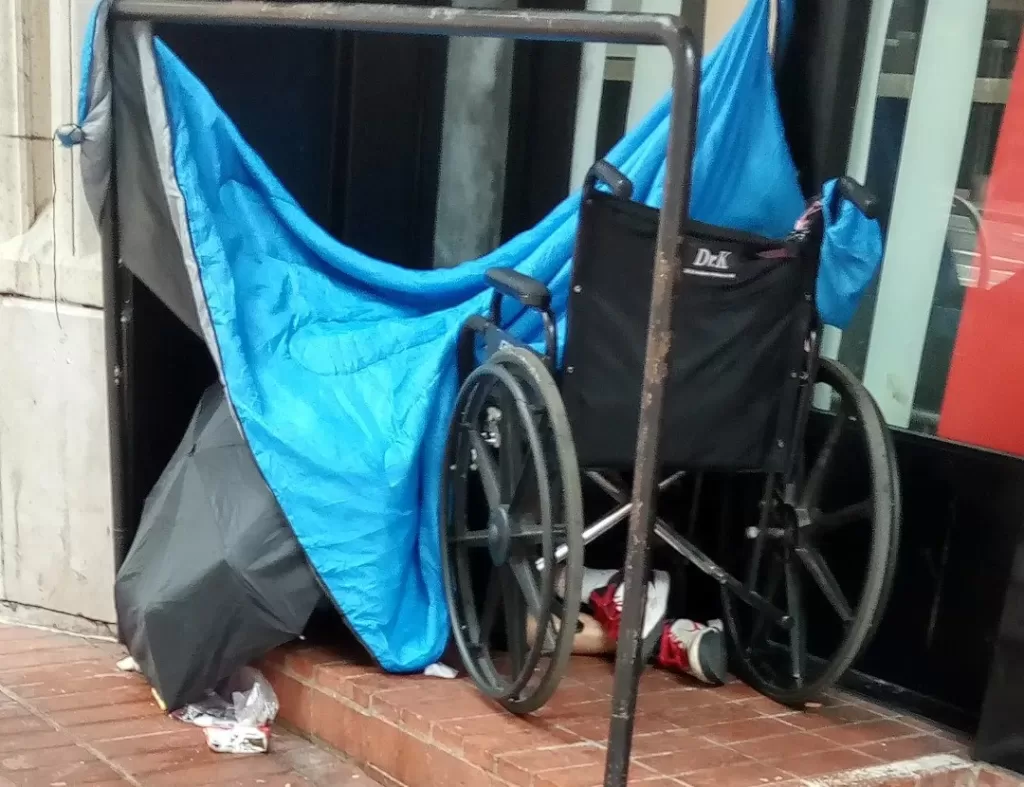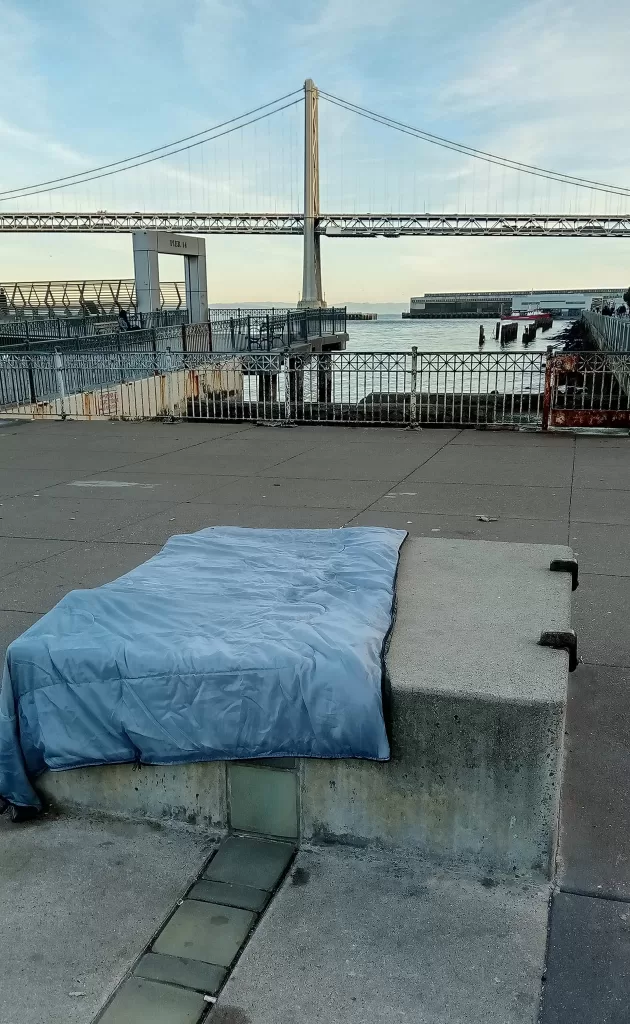
To most people, I’m invisible—just another nameless Black man blending into the urban background. People avoid making eye contact as they walk past me on the sidewalk. Pretend not to notice me shivering on the street corner. But if you look closely at the worn lines on my face, you’ll see the story of how I wound up here.
I’ve been homeless on and off for the past decade since losing my job as a machinist. The company outsourced jobs overseas, and I was part of a mass layoff. Without work, I fell behind on rent until I was evicted from my apartment. Since then, I’ve struggled to get back on my feet while battling discrimination, mental health issues and an unforgiving housing market.
Being homeless in San Francisco means waking up each morning not knowing where you’ll lay your head that night. Some days I stay in shelters, lining up early to try and secure a bed. Other nights I’m turned away and forced to sleep on the cold concrete under an overpass or in a park. Every sound jolts your senses when you’re that exposed.
As a Black man, I face extra suspicion and harassment from police. They assume I’m up to criminal activity or on drugs. I’ve been stopped and frisked countless times as I walk down the street. It’s humiliating and dehumanizing. All it takes is one officer having a bad day to turn it into a violent encounter.
Many homeless service providers also discriminate without realizing it. When seeking housing assistance, I’m bombarded with questions about my drug use or criminal background. The assumption is that I must be a troubled individual who made bad choices to end up in poverty. In reality, one stroke of bad luck is all it takes now, with the cost of living so high. Landlords won’t rent to me even if I get a housing voucher because of my race.
Maintaining personal hygiene while homeless is a constant struggle. With limited access to bathrooms and showers, I do my best to keep clean using public sinks. But I still face judgment for my worn, dirty clothes. Passersby seems to think it’s a conscious choice rather than a lack of access to laundry. Without regular hygiene, health issues like infections easily arise.

Finding a legal place to relieve myself is nearly impossible, leaving public urination my only option. This opens me up to more harassment and tickets I can’t pay. I’m treated like a nuisance for just trying to meet a basic human need.
My physical health has deteriorated rapidly while living outside. The cold and damp aggravates my arthritis to the point I can barely move some mornings. Simple colds quickly turn to pneumonia without a warm, dry place to rest. Lack of nutrition makes it hard to fight anything off. I have multiple chronic illnesses now that I can’t properly manage.
Perhaps the most painful part is the intense loneliness. I isolate myself to avoid judgment and misunderstanding. My family won’t speak to me while I’m homeless, even though it wasn’t my fault. The indignity and helplessness cuts so deep that I struggle under the weight of depression. My mental health suffers without proper care. It’s a vicious cycle of declining well-being with no end in sight.

But the story of homelessness in San Francisco isn’t just about personal troubles. It’s the story of a system that has failed. Failed to build affordable housing. Failed to provide accessible health care, job assistance, and substance abuse treatment. Failed to offer community support networks that could help people get back on their feet after a crisis.
So here I remain, clinging to life and hope on the harsh streets of the city I once loved. I know I’m just one of over 8,000 homeless residents here. Our struggles may overwhelm the senses of those who only view us from the outside. But we are human beings worthy of dignity, compassion, and care.
All I want is a stable home where I can rebuild a sense of purpose. A place to sleep where sirens don’t wake me hourly. The comfort of a hot shower, clean clothes and a nutritious meal. Resources to manage my health conditions and mend my spirit. I don’t think that’s too much to ask in a country overflowing in wealth.
But until society’s moral compass shifts, the only things protecting me are anonymity and invisibility. Just another Black man rendered nameless on the streets of San Francisco.
Editor’s note: This article first appeared in the February 2024 edition of the Street Sheet, published by the San Francisco Coalition on Homelessness.

We’re invisible until we need a restroom and some rest,
Sarah,
This is a very powerful statement. A machinist who lost his job and now his family won’t talk to him anymore. Thank you for capturing this moment and giving our brother an opportunity to explain his living situation.